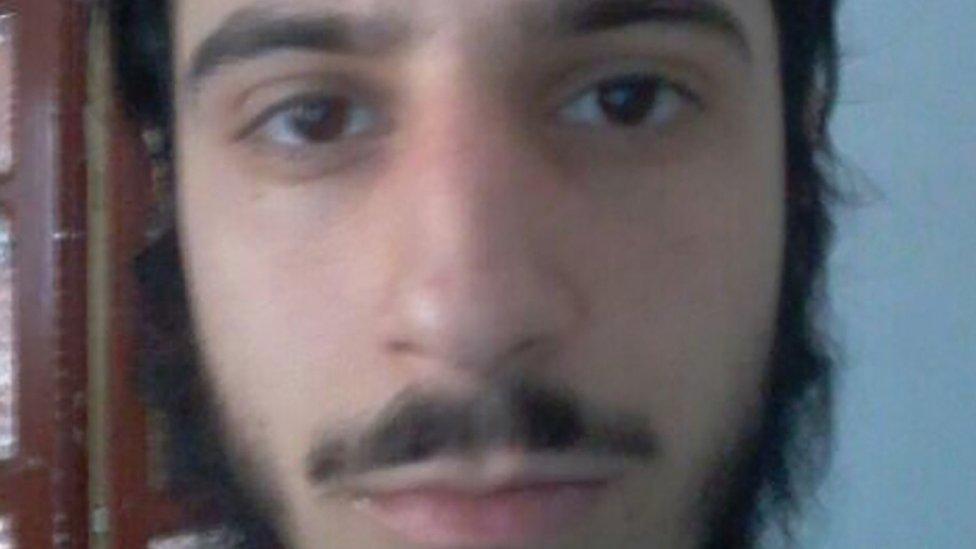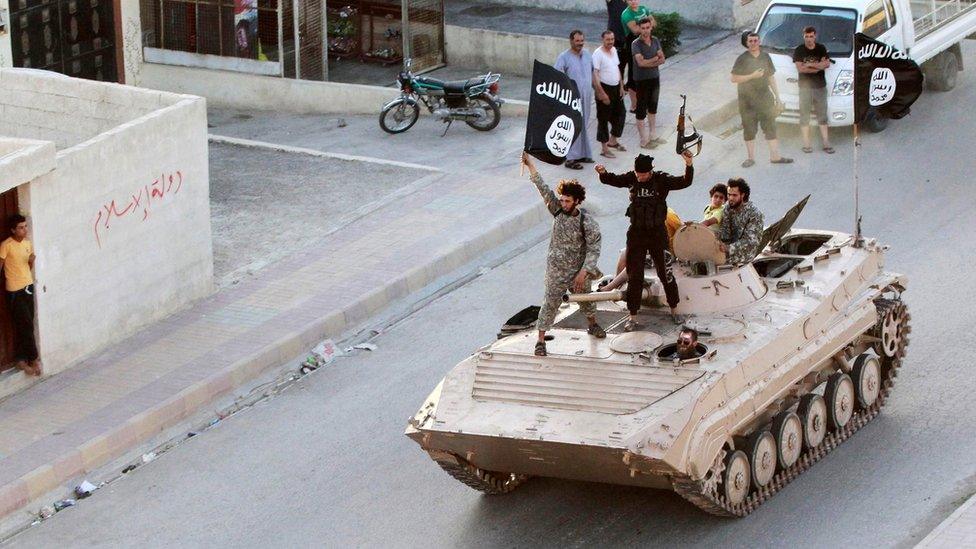Man admits sharing Islamic State beheading videos
- Published

Stefan Aristidou was arrested at Heathrow Airport on 3 February by counter terrorism officers
A British man who went to Syria to join the Islamic State (IS) group has admitted sharing beheading videos.
Stefan Aristidou, 27, entered guilty pleas to four terrorism offences at the Old Bailey and will be sentenced in September.
BBC research reveals he is the 14th person convicted of terror charges out of hundreds who returned from Syria after joining jihadist groups.
The research shows only 3% of returnees have been convicted of such offences.
Aristidou, from Enfield in north London, travelled to Syria in April 2015 with Kolsoma Begum, whom he had married shortly before.
He was reported missing by concerned family members.
Aristidou, who is of Cypriot origin, is a convert to Islam.
The couple spent time living in Raqqa - then the "capital" of Islamic State's self-declared caliphate - and had a baby while living in Syria.
Turkish sentences
They were later arrested crossing into Turkey in April 2017.
Both were convicted in a Turkish court in October 2018 of being part of IS.

The Islamic State group urged Muslims to migrate to their new "caliphate"
They were each sentenced to more than six years in prison, although Kolsoma Begum was convicted in her absence having already been returned to the UK with their child.
Aristidou was deported in February this year and arrested on arrival at Heathrow airport.
He had a phone with him which had not been used since before his arrest in Turkey in April 2017.
It contained text exchanges with his wife, ending with him saying he was "giving self into Kuffar" - or non-Muslims.
The four offences Aristidou has now admitted were committed in 2014 before he went to Syria, when he had sent other people IS videos depicting public executions and beheadings.
He pleaded not guilty to three similar offences and prosecutors will ask for these charges to be left to lie on file.
Few prosecutions
The case highlights the challenge of prosecuting people for their actions in Syria.
The government has previously said more than 900 people from the UK went to Syria to join jihadist groups.
A senior MI5 official said this year that about half have since returned to the UK, equating to about 450 people.
The government has given shifting figures to Parliament on the number of returnees prosecuted:
In 2016, it said the Crown Prosecution Service (CPS) had prosecuted 35 cases involving 54 defendants who were suspected of having fought in the region, with 13 ongoing prosecutions involving 30 defendants.
In 2018, a Home Office minister said approximately 40 people had been prosecuted, either because of activities in Syria or links to the conflict there.
In 2019, the government clarified these 40 people had been charged with a range of offences not limited to those covered by terrorism legislation - and in some cases, might not even realise they had been investigated for non-terror offences because of their engagement in terrorism.
The government has never confirmed how many of these people have actually been prosecuted for terror offences.
Last year, in response to a freedom of information request from the BBC, the Home Office said it "does not hold the information".
The CPS also says it does not have the figures.
Few convictions
However, research by the BBC which has examined all recent terrorism prosecutions, has found that only 14 people who crossed into Syria have been convicted of terror offences after returning to Britain.
The first case was in 2014, with Aristidou the most recent.
The figures mean that approximately 3% of 450 returnees have been convicted of terror offences.
Five people in total have been convicted of IS membership, but only two of them are returnees from Syria.
The other three people had joined the group in the UK, meaning individuals are more likely to be charged with IS membership if they never went to Syria.
Kurdish militia
Separately, four people who fought against IS with the Kurdish YPG militia were charged with terror offences after returning to Britain.
The number who went to join the YPG has been placed as low as 30, suggesting a higher proportion of YPG fighters were charged with terror offences despite receiving western military support in their campaign against IS.
No one who returned to the UK after joining jihadist groups has been charged with offences under war crimes or torture legislation, which provide an avenue of prosecution for crimes committed outside UK borders.